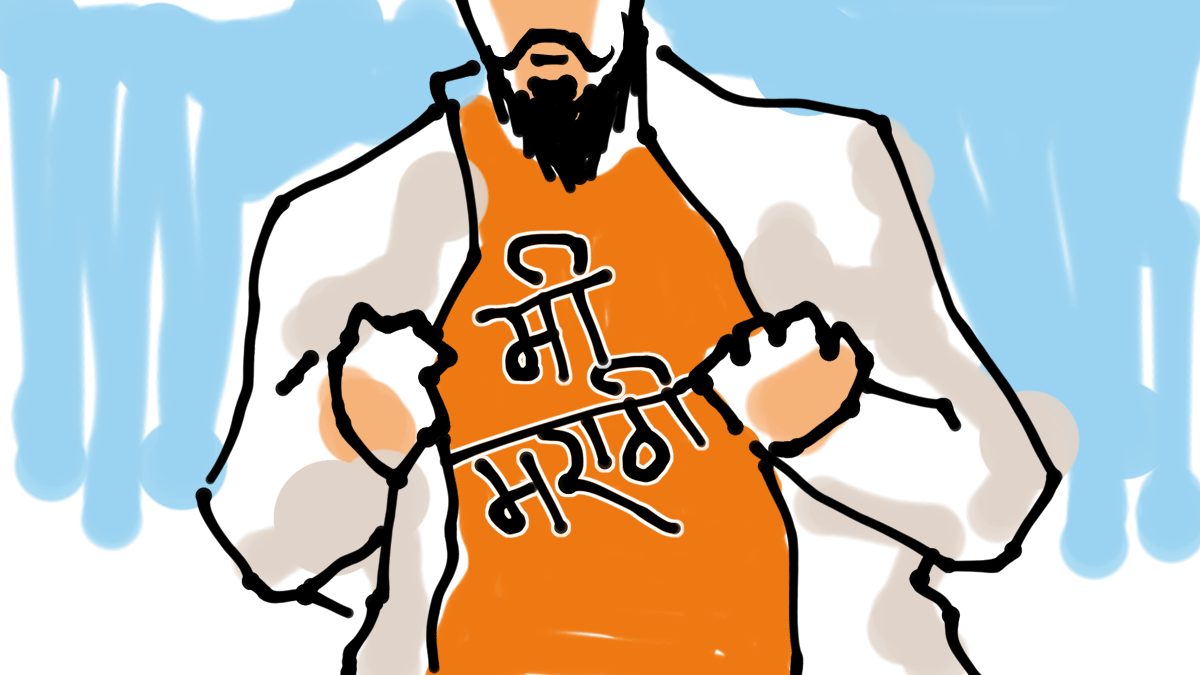'There are tall personalities who have utilised Mumbai and Maharashtra for their career growth, but they never thought it is their responsibility to learn Marathi.'

As debates around Hindi imposition intensify, a deeper question must confront Maharashtra: Can Marathi evolve into a language of economic empowerment?
In the concluding part of a three-part interview (you can read the first two parts in the related links on the right), Dr Deepak Pawar, president of the Marathi Abhyas Kendra, tells Prasanna D Zore/Rediff that agitations, tweets, or campaigns will amount to little unless Marathi becomes a language of employment -- integrated into banking, education, governance, and culture. (This interview was conducted before the Maharashtra government withdrew its order to teach Hindi from Class 1.)
Before Raj Thackeray's tweet, the MNS's 'Marathi in Banks' campaign saw its workers engage in some violent agitations recently.
What methods do you think will be used in the future by those agitating against the imposition of Hindi?
The MNS demand is not new. The bank circulars (issued by the RBI) clearly state that the regional language should come first, then Hindi, and then English. That applies to every single document -- including ATMs, forms, everything.
So if prominent people have gone to banks and asked them to comply, why should bank officers be upset?
Some non‑Maharashtrian officers say, 'We don't want MNS to threaten us.' But would they dare ask the same question to the DMK in Tamil Nadu or to parties in Andhra Pradesh?
What MNS or any party is demanding is that Marathi be respected in Maharashtra. Officers working in these banks -- whether Maharashtrian or not -- must follow the three‑language formula.
If they are so unhappy with the use of Marathi in Maharashtra, they should quit and go back to their native states. If they want to work only in Hindi, they should go to UP and Bihar -- and see what happens to their employment opportunities.
Do you think Maharashtra is ripe for an anti‑Hindi agitation like we've seen in Tamil Nadu? And will politicians try to seek dividends from it?
The situation is not only ripe for an anti‑Hindi agitation -- but also for a genuine federal movement. It's ripe for healthy Centre‑state relations and greater autonomy to the states.
What (Tamil Nadu Chief Minister M K) Stalin is asking for in Tamil Nadu -- the situation in Maharashtra is similar. Whether our political class and elites are mature and agile enough -- that only time will tell.
Beyond political parties, how are civil society players -- like teachers' unions, parent‑teacher associations, and cultural organisations -- mobilising people on the teaching of Hindi from Class 1?
Most people are speaking against the imposition of Hindi -- whether they are in civil society, teachers' bodies, cultural organisations, or even celebrities.
They are all united in spirit. But more importantly, this entire effort must be consolidated. It needs to be institutionalised. There must be long‑term, perpetual pressure on the political elite to not reverse their stand on the regional language.
That will take some time.
Raj Thackeray has linked Hindi imposition to Maharashtra's economic woes -- loan waivers, youth unemployment, industrial decline. How might these material grievances amplify linguistic polarisation?
Linguistic anger is also part of the political economy.
In urban and semi‑urban Maharashtra, when jobs are scarce and North Indians take the ones that are available -- there is bound to be a sense of grievance, of anger.
(The undivided) Shiv Sena and MNS have long failed to realise that language must also be an instrument of employability. Language education must go beyond literary education -- it must generate jobs.
If civil society and the government focus on this, we can perhaps sail through these tough times for the Marathi language.
On one hand, politicians like Raj Thackeray and other parties have started a sort of anti‑Hindi movement. On the other hand, Marathi‑medium schools -- especially government‑run ones -- are shutting down. How do you see this contradiction?
The organisation I work with -- Marathi Abhyas Kendra -- has been saying for years: No love for Marathi is meaningful unless we strengthen Marathi‑medium schools.
Politicians and elites must send their children to Marathi‑medium schools. The inferiority complex that the Marathi manoos has about sending their kids to such schools has to go. Yes, that complex has seeped in.
So opposing Hindi imposition is right -- but that alone is not enough. We have to ensure more children study in Marathi. We must develop proper reference material and textbooks in Marathi. Marathi must become a language of employment.
Only then will these agitations have any real meaning.
Could enforcing Marathi‑only spaces in business, investment, or tourism in the state backfire? What steps can policymakers take to strike a balance between linguistic identity and economic openness?
See, having Hindi cinema might have given employment to some Maharashtrians. Definitely, it has given employment to Maharashtrians. But at the same time, it has given sizeable employment to non‑Maharashtrians.
If you look at Film City (the film studio in suburban Goregaon, north west Mumbai), you'll see that it was initially made for shoots of Marathi serials and Marathi cinema, but now you'll find very few studios there where Marathi serials are being shot.
There's complete Hindi hegemony; absolute Hindi hegemony. And those who are enjoying that hegemony -- they are so shameless -- they don't think it is their responsibility to learn Marathi.
So whether it is the so‑called sadiyon ka mahanayak Amitabh Bachchan or the person whom Raj Thackeray calls for his Marathi Bhashadeen programme Javed Akhtar -- they can't speak in Marathi.
So there are celebrities, there are tall personalities who have utilised Mumbai and Maharashtra for their career growth, but they never thought it is their responsibility to learn Marathi.
Like Rajinikanth learnt Tamil?
Yes, he's a Maharashtrian by birth, but Rajinikanth today is more Tamilian than Tamilians!
Now this does not happen with Amitabh Bachchan or Shah Rukh Khan or Salman Khan. Maybe Aamir Khan would make some minor effort to learn Marathi, but that is too little and too less.

What steps can policymakers take to strike a balance between linguistic identity and economic or social openness?
As far as linguistic development is concerned, the government is not doing much. But as far as economic development is concerned, what are they doing?
What is it that Maharashtrians are asking for? Maharashtrians are not saying that they don't want Hindi‑speaking people. Maharashtrians are not saying they don't want people from outside the state.
Maharashtrians are simply asking for some respect for their language. If they're asking for respect for their language, that respect cannot be considered a hurdle to openness.










